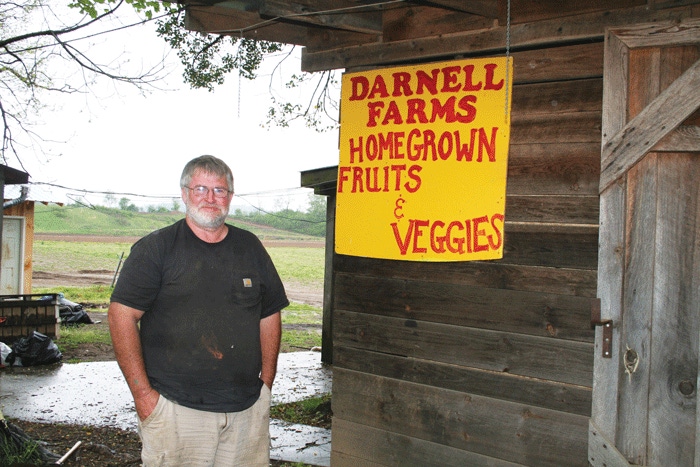
Jeff Darnell beats odds with North Carolina strawberries
• Jeff Darnell, who grows commercial strawberries and a number of other fresh market crops in addition to strawberry plants, provided about 14 million plants to Florida last year.• Darnell and his son grow strawberries along the banks of the Tuckasegee River in and around Bryson City, N.C.
June 27, 2013

Bite into a flavorful Florida grown strawberry in the winter months and the odds are about 50-50 it started out in western North Carolina.
Jeff Darnell, who grows commercial strawberries and a number of other fresh market crops in addition to strawberry plants, provided about 14 million plants to Florida last year.
Darnell, once the only strawberry plant propagator in western North Carolina, says there are now 5-6 strawberry growers in the Great Smoky Mountains of western North Carolina, and each produces as many or more strawberry transplants than he grows annually.
Darnell and his son grow strawberries along the banks of the Tuckasegee River in and around Bryson City, N.C.
“Our primary business is growing strawberry plants, but we do grow strawberries for sale, and are beginning to see some opportunities to grow for major retail chains, like Harris Teeter, he says.
Strawberries at one time were a backyard hobby in North Carolina, or at best a patch here and there for roadside sales and farmers markets. Not anymore. North Carolina is now the fourth largest strawberry producing state in the country — and closing in fast on No. 3 Oregon.
One of the driving forces behind the industry’s rise in prominence in recent years is Jeff Darnell.
“My mother was a music teacher in western North Carolina, and the one thing she stressed over and over was to find a professional career in something other than music. I think I shocked everyone in my whole family by majoring in horticulture at the University of Tennessee, then coming home to the mountains to start farming,” Darnell says.
“I had no family involved in farming, and I didn’t have any experience working on a farm. Back then, I saw an opportunity to grow crops in what we call ‘rabbit patches’ or 10-20 acre fields up and down the Tuckasegee River Valley. Now, my whole family and lots of my friends are in the business,” he adds.
On the East Coast, Florida is by far the largest strawberry producing state, though on a national scene their production is dwarfed by California. Darnell sells strawberry plug plants, bare root plants, and root tips for sale into the Florida market.
River soils very productive
One thing he has going for him, he says, is ‘ambiance’. The scenic beauty of the Smokey Mountains and the pristine Tuckasegee River are hard to match. The rich river soils are also very productive, but in limited supply up and down the mountain valleys of western North Carolina.
Strawberries, whether grown for plants or the berries, is a high risk, potentially high profit venture. Darnell says on the one hand an acre of strawberries may bring in $40,000-$50,000, and on the other hand that might not be enough to make a profit — if things go wrong.
Looking out over a 10 acre field of strawberries, which grow to within 20 feet or so of the Tuckasegee River, Darnell says he should easily pick 1,000 flats of strawberries a day from the field in peak production. If things go well, he says, he could end up with something close to 400,000 pounds of strawberries from the field.
The North Carolina grower hedged his bet on the field of strawberries, with a second crop — not all together different than a grain grower does planting winter wheat and soybeans in the same field.
In Darnell’s case, he harvested about 3 million strawberry plugs from the field in the early spring, then refurbished it for strawberry production.
Growing so intensively can be an environmental challenge in remote areas of the country, but these strawberries are growing a few feet from a scenic river and only slightly farther from Bryson City, one of the top whitewater rafting destinations in the Southeast.
“We are very careful about what we spray on our crops, and if practical, we don’t spray at all,” Darnell says.
For example, mites are an ever present problem in strawberry production in the eastern half of the country, but last year Darnell didn’t make a single miticide application, Instead, he uses predator mites, most of which come from Israel.
The river that runs through his farm is consistently ranked among the most environmentally safe in the country. Darnell says the TVA (Tennessee Valley Authority) checks the river on his farm annually. Every year it rates a 60, which is the highest rating possible, he says.
Perfect setting
“Just look around you, he says, pointing to the scenic river and the mountains that mark the entrance to Nantahala Gorge and National Park. We have the perfect setting to raise crops and raise our family, we have nothing to gain and everything to lose by taking environmental chances in our farming operation, and we just don’t do it,” the North Carolina grower says.
Darnell says Western North Carolina strawberry growers are beginning to see some opportunities for expanding commercial strawberry production.
“The whole buy local, buy fresh movement seems to be catching up with strawberries, and we have seen some interest from Colorful Harvest, Harris Teeter and other large operations that could buy a lot of fresh North Carolina strawberries,” he says.
For growers thinking about putting in a few acres of strawberries, Darnell urges them to find a market. Having a market to sell your crop is critical, but don’t let a few closed doors ruin your dreams, he cautions.
“There is absolutely no good economic reason for me to have started a farming operation here, but I did, and it now provides a living for me and my son and other members of my family and friends,” he says.
Two factors, land and labor, Darnell contends will be the limiting factors in the growth of the strawberry industry in North Carolina. “For someone getting into the strawberry business, I think picking land wisely is a critical factor. There is land available in these mountain valleys, but it’s hard to come by and some of it just isn’t suitable to growing crops,” he adds.
“Labor is a big issue in our farming operation, and I suspect, for anyone in a highly intensive production system in the U.S. Labor is a big contradiction in our country. People want fresh, safe, high quality food, but they don’t foreigners in the country — we just can’t have it both ways,” Darnell says.
Not one to shy away from the labor issue, Darnell was recently featured on a segment of 60 Minutes, the highly rated CBS news show.
“They were looking at farm labor, and particularly at young farm labor. I always had a job for my kids and their friends. If they needed some extra money, I’d give them a job,” Darnell says.
David Stern, a producer for 60 Minutes and film crew spent a week on Darnell’s farm. He saw a bunch of kids — American and Mexican, who were glad to have somewhere to go and something to do in the summer, and they were glad to have some extra money to buy things.
“Like I told David Stern, the people who pick our food don’t come from the Hamptons.
“Not just for strawberries, but for most food crops, we badly need a workable farm labor program that will give small and large operations an equal shot at finding and keeping reliable farm workers,” the North Carolina grower says.
More from Southeast Farm Press
Another farm bill extension appears likely
Be sure you have a reason to treat corn insects at tassel stage
Kudzu bugs found in east Tennessee soybeans
Equipment forum: Loftness adds new features to GBU10 grain bag unloader
About the Author(s)
You May Also Like





